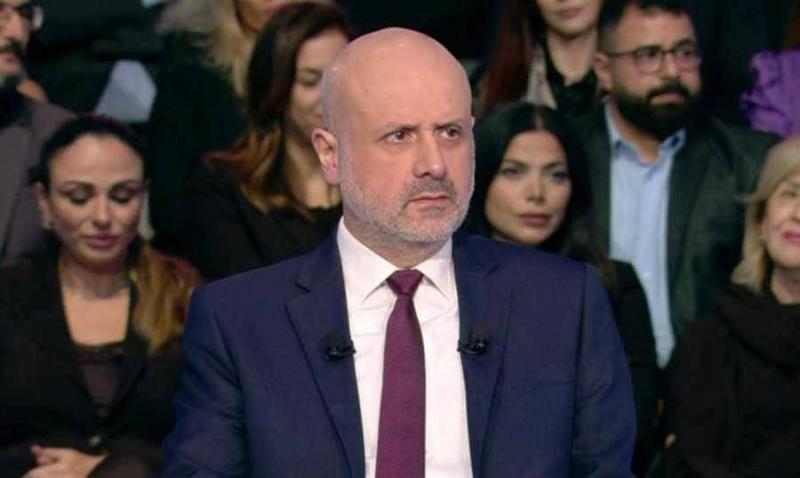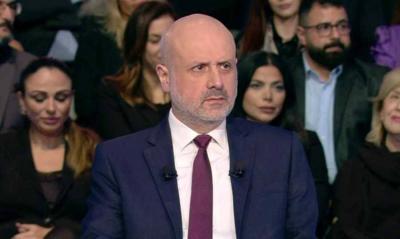Interior and Municipalities Minister Judge Bassam Mawlawi stands at the intersection of security and justice, seeking to take the initiative to provide safety and stability amid the collapse and its significant impacts on security forces. He is committed to boosting their morale and securing their needs. "We will continue to perform our constitutional and legal political duties and what our conscience, constitution, and law mandate, while ensuring the interests and rights of the people," he stated, insisting that the state cannot be paralyzed while waiting for a presidential election and calling for an end to the method of obstruction in constitutional entitlements.
Mawlawi opens his talk with "Nidaa al-Watan" by affirming his commitment to relations with Arab nations, recalling what he told the Kuwaiti Foreign Minister upon his reception at the ministry: Lebanon should not be a source of actual or verbal harm to Arab countries. "While we call for independence, we will not accept that our country becomes a launchpad for interference in the policies or security of Arab nations, nor a conduit for drugs or destructive political ideologies that harm society, peace, and security... at a time when Arabs have always stood by Lebanon, especially in supporting its reconstruction after the July 2006 war."
He pointed out that "the Gulf countries now have a clear vision politically, economically, socially, and security-wise, allowing them to foresee future developments over the next ten years, and we in Lebanon must also possess this clear vision." Mawlawi insists on holding onto positives despite the prevailing negative realities, the most significant of which is "a blessing that many do not see: the Lebanese do not want war. The proof is that the Tayouneh incident ended within two hours, as it could have ignited a war if there was a desire for it. Religious and moral awareness still prevails, and there is a conviction that fighting is not beneficial to anyone."
### The Finality of the Lebanese Entity and Arab Identity
Mawlawi emphasized the necessity of "holding onto the constitution and the Taif Agreement, which affirmed the finality of the entity and Lebanon's Arab identity, which has become tied to the balance of power. The imbalance prior to the Taif Agreement led to war. What we are experiencing today in terms of imbalance is the cause of problems; balance is needed to preserve the powers of everyone without targeting any presidential position, as is currently happening with the targeting of the government presidency, which is exercising its powers."
He warned of the continuing political crisis without a prospect for resolution and stated, "It is unreasonable for the state to be paralyzed if the deputies do not reach a presidential election. We urge them to elect a president as soon as possible. However, I cannot burden citizens with the costs of a ship currently at sea costing $18,000 daily, taken from depositors' funds under the pretext of any type of obstruction... and we cannot stop medicine, flour, and bread from the people while claiming this relates to the rights of Christians, and that the Sunni is taking their place..." He clarified that "Sunnis are not taking the powers of others; rather, they are exercising their constitutional role, and we do not accept anyone infringing on the constitutional powers of the Prime Minister, especially his authority to set the agenda."
Mawlawi described what we are witnessing as a "political catastrophe" resulting from "the failure to respect the constitution and a group exercising powers not granted to them by the constitution, finding no way to exercise these powers except by obstruction. Positivity must prevail in dealing with public matters." Reflecting on his judicial position, Mawlawi stated: "Our constitutional system states that in the event of a vacancy in the presidency, the cabinet assumes power. What the Justice Minister said regarding Article 62 of the constitution is incorrect. It actually states that the powers of the president transfer to the presidency of the cabinet, and it does not mention a council of ministers; thus, it is not correct that all ministers must sign; it is sufficient to secure a quorum.”
### Responsibilities for Security and Bearing the Consequences of Catastrophe
Mawlawi clarifies the points of connection and disconnection in dealing with the crisis, stating that he and his ministry are responsible for security and "those responsible for the economic file must determine their choices and find solutions. The solutions to the collapse are not with the Ministry of Interior, but we bear its consequences, such as the banking crisis and rising prices, which weigh heavily on us, as security forces are compelled to operate under these harsh conditions. It is my duty to seek to secure their requirements to withstand and continue performing their duties. I am with them in a relationship of affection and love and follow their affairs closely."
Among the repercussions of the crisis on the work of the Ministry of Interior is, amid the complete blackout of electricity and the absence of healthcare and food, "we are forced to secure all these needs for prisons; we cannot allow electricity to go out or food to be absent from prisons; this is a real suffering borne by the Ministry of Interior beyond its mission," he noted, adding that half of Lebanon's population has become Syrian, and over half of juvenile prisoners are of Syrian nationality, as well as one-third of adult prisoners, in addition to other nationalities.
He expressed astonishment at the judiciary’s actions amid this crisis, "where 81% of detainees are held without trial, while applying the criminal procedure rules mandates the immediate release of 1,200 prisoners. This delay increases the burdens on the ministry in terms of guarding, lighting, healthcare, and food."
### We Will Not Clash with the People
Mawlawi rejected the notion of the security forces clashing with the people amid the fallout from the banking crisis and refused the shedding of blood, "because the mission of the security forces is to protect the people, not suppress them. If people protest in front of the Ministry of Interior, I will open the doors for them and say this is your house." He affirmed that he personally monitored every incident of bank storming directly with the officers on the ground, emphasizing peaceful solutions; depositors have their rights, and the Ministry is working to protect society, citizens, and public order, not banks.
Mawlawi does not hesitate to confirm his adherence to public morals and reject their violation, asking, "Is Lebanon's problem really with ‘homosexuality’ that they bring up from time to time? Let them review the Council of State, and issue a daily decision to halt its implementation, and I will act to prevent their activities each time." He wondered why we would aim to demolish society instead of building it, affirming that he is driven by faith and moral principles in this stance, and he will continue combating this harm that befalls our Lebanese society and our Arab communities. He indicated that he told the ambassadors who visited him and some change deputies: "This is not freedom; this is harm. Freedom ends when it turns into an infringement upon others, in law and in morals."
He affirmed that "security is stable, and our security level is good compared to European capitals. Crime rates in 2022 were better than ever in all types of crimes except for theft in areas where Syrians are prevalent." He noted that security forces managed to arrest the shooters in the two murder cases that occurred in Tripoli, citing a clear decline in gunfire incidents during New Year’s celebrations, and he personally accompanied the performance of the security forces on the ground, and the atmosphere was positive.




